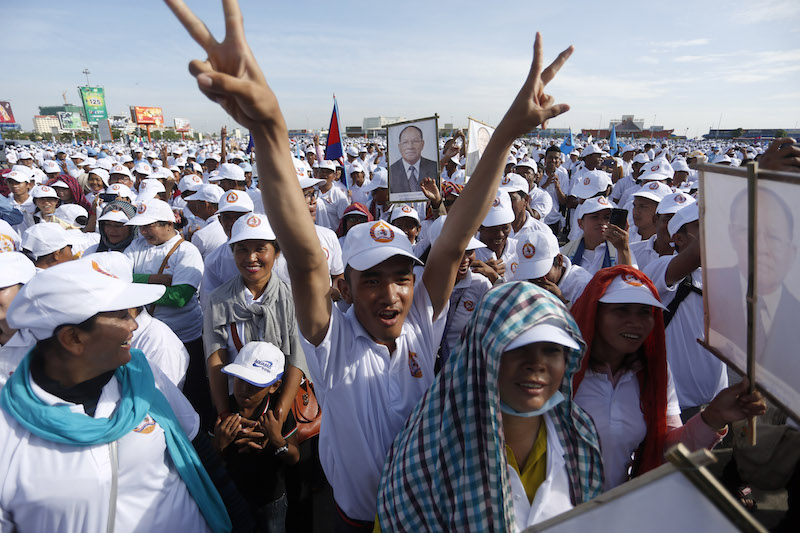After this month’s commune elections, the long-ruling CPP will be losing more than hundreds of incumbent councilors across the country. Thanks to its pre-election promises, the party—and possibly the government itself—will also start hemorrhaging millions of extra dollars.
In the months leading up to the June 4 poll, anticipating the losses to come, the CPP promised to use the party’s coffers to keep paying its commune councilors’ salaries should they be voted out.

Deputy Prime Minister Men Sam An did one better in a February 16 directive issued on behalf of Prime Minister Hun Sen, the CPP president. She told government agencies to give jobs to the losers and told them they “must accept” any party incumbents left off the ticket as assistants. She even specified how much they were to be paid based on their past commune posts.
Keeping those promises will cost millions.
According to preliminary results, the CPP, while hanging on to the majority of the country’s 1,646 communes on June 4, lost 1,771 commune council members, including 429 commune chiefs.
Salaries are low, but they add up. Chiefs, the highest paid elected officials in a commune, earn 750,000 riel a month, or about $188. Assuming that the rest of the CPP’s losses, besides the 429 chiefs, are split evenly between deputies and regular council members, the bill for keeping them paid at their old salaries comes to roughly $3 million per year. Neither the CPP nor the government have said how long the payouts or new jobs might last. And that’s not counting the CPP incumbents who did not stand in the election and were also promised ongoing support.
Days after the election, reacting to a Radio Free Asia story about the pre-election promises, the Interior Ministry issued a statement appearing to contradict Ms. Sam An’s directive on the premier’s behalf. It insisted that the government “did not have a policy” of appointing council members not elected to office this year as assistants or advisers “at the ministry or other institutions.” The ministry said it did, however, plan to make advisers and assistants of “only some” council members left out of the race to take advantage of their “human resources.”
Neither Ms. Sam An nor Khieu Sopheak, spokesman for the Interior Ministry, could be reached to clarify the government’s plans. Government spokesman Phay Siphan also could not be reached.
CPP spokesman Sok Eysan said he did not know how many incumbent council members had been left off the CPP tickets this year and that the party was waiting for the June 25 final election results to decide how to proceed.
“I just want to say that the CPP has never abandoned its officials,” he said.
Picking up the losers’ salaries would be little burden for the CPP, which can tap into a long list of wealthy tycoons with close ruling party ties who have proven generous in donating to its pet projects over the years.
But if the government does end up drawing on state coffers to fatten what some analysts consider an already bloated bureaucracy, critics worry of a waste of public resources.
“We cannot just [create] unnecessary positions…or create unnecessary jobs just because we want to hire these people,” political analyst Meas Nee said. “This is very unprofessional.”
He said the government has already allocated its budget, but could probably draw on the $854 million set aside for “unallocated spending.” Critics claim the ill-defined line item gives the prime minister broad spending powers with very little oversight.
Wherever the money comes from, Mr. Nee said the practice of finding work for the party’s abandoned or defeated council members was old hat for the CPP.
“They keep them just because they want their support,” he said. “It’s totally part of the patronage system.”
The only difference this time, he said, is that “it’s a large-scale loss.” It also comes just over a year out from a national election in which the CPP is expected to face stiff competition from its main rival, the CNRP, which won well over 40 percent of the popular vote on June 4 under tough circumstances.
In Siem Reap province, Konh Hort has been the chief of Chi Kreng district’s Khvav commune for the CPP since 2002. The CPP lost the commune to the CNRP on June 4, though Mr. Hort’s second-place position on the CPP ticket means he may still get a seat on the council. The CPP candidates below him may not be so lucky.
Mr. Hort said he had not heard of the promises to keep paying the losers’ salaries or to find them government jobs. But come what may, he said, most of them still had farms to fall back on and insisted they would not be swayed.
(Additional reporting by Ouch Sony)



